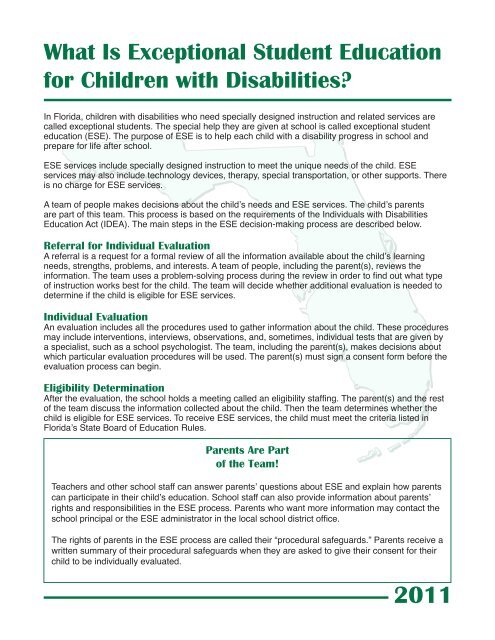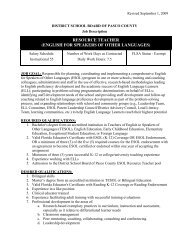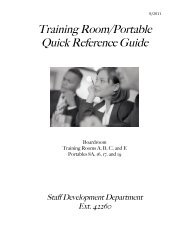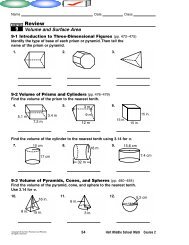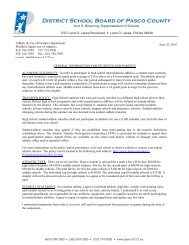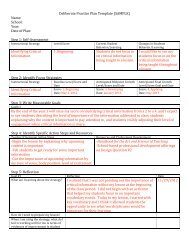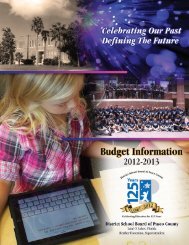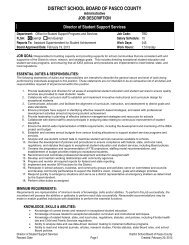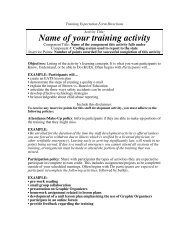What Is Exceptional Student Education for Children with Disabilities?
What Is Exceptional Student Education for Children with Disabilities?
What Is Exceptional Student Education for Children with Disabilities?
Create successful ePaper yourself
Turn your PDF publications into a flip-book with our unique Google optimized e-Paper software.
<strong>What</strong> <strong>Is</strong> <strong>Exceptional</strong> <strong>Student</strong> <strong>Education</strong><strong>for</strong> <strong>Children</strong> <strong>with</strong> <strong>Disabilities</strong>?In Florida, children <strong>with</strong> disabilities who need specially designed instruction and related services arecalled exceptional students. The special help they are given at school is called exceptional studenteducation (ESE). The purpose of ESE is to help each child <strong>with</strong> a disability progress in school andprepare <strong>for</strong> life after school.ESE services include specially designed instruction to meet the unique needs of the child. ESEservices may also include technology devices, therapy, special transportation, or other supports. Thereis no charge <strong>for</strong> ESE services.A team of people makes decisions about the child’s needs and ESE services. The child’s parentsare part of this team. This process is based on the requirements of the Individuals <strong>with</strong> <strong>Disabilities</strong><strong>Education</strong> Act (IDEA). The main steps in the ESE decision-making process are described below.Referral <strong>for</strong> Individual EvaluationA referral is a request <strong>for</strong> a <strong>for</strong>mal review of all the in<strong>for</strong>mation available about the child’s learningneeds, strengths, problems, and interests. A team of people, including the parent(s), reviews thein<strong>for</strong>mation. The team uses a problem-solving process during the review in order to find out what typeof instruction works best <strong>for</strong> the child. The team will decide whether additional evaluation is needed todetermine if the child is eligible <strong>for</strong> ESE services.Individual EvaluationAn evaluation includes all the procedures used to gather in<strong>for</strong>mation about the child. These proceduresmay include interventions, interviews, observations, and, sometimes, individual tests that are given bya specialist, such as a school psychologist. The team, including the parent(s), makes decisions aboutwhich particular evaluation procedures will be used. The parent(s) must sign a consent <strong>for</strong>m be<strong>for</strong>e theevaluation process can begin.Eligibility DeterminationAfter the evaluation, the school holds a meeting called an eligibility staffing. The parent(s) and the restof the team discuss the in<strong>for</strong>mation collected about the child. Then the team determines whether thechild is eligible <strong>for</strong> ESE services. To receive ESE services, the child must meet the criteria listed inFlorida’s State Board of <strong>Education</strong> Rules.Parents Are Partof the Team!Teachers and other school staff can answer parents’ questions about ESE and explain how parentscan participate in their child’s education. School staff can also provide in<strong>for</strong>mation about parents’rights and responsibilities in the ESE process. Parents who want more in<strong>for</strong>mation may contact theschool principal or the ESE administrator in the local school district office.The rights of parents in the ESE process are called their “procedural safeguards.” Parents receive awritten summary of their procedural safeguards when they are asked to give their consent <strong>for</strong> theirchild to be individually evaluated.2011
<strong>What</strong> Happens if the Child <strong>Is</strong> Eligible?Development of the First IEPIf the child is eligible <strong>for</strong> ESE services, the next step is to hold a meeting to write an individualeducational plan (IEP). The child’s parents are invited to this meeting because they are part ofthe IEP team. The IEP team decides which special services and supports the child needs inorder to make progress and achieve his or her annual goals.The IEP team also decides where the child will receive services. Most children <strong>with</strong> disabilitiesspend the majority of their school day in general education classrooms. Some children leavethe general education classroom <strong>for</strong> part of the day to receive services in an ESE classroom. Afew children spend all day in a special classroom or in a special school.Consent <strong>for</strong> Services to BeginA child cannot receive ESE services <strong>for</strong> the first time until the IEP is written and a parent hasgiven written consent.Review and Revision of the IEPThe IEP team decides how a child’s progress will be measured and reported. At least onceevery 12 months, the IEP team meets to talk about the child’s progress and to develop a newIEP. However, because a child’s needs may change at any time, the IEP may also be revisedat other times. The IEP team generally makes changes to the IEP at an IEP team meeting.However, sometimes the parent(s) and the school district may agree that the IEP can bechanged <strong>with</strong>out a meeting. Whenever changes are made to the IEP, the changes agreed toare documented in writing. Parents may request a copy of the revised IEP.This publication was developed and produced by the Bureau of <strong>Exceptional</strong><strong>Education</strong> and <strong>Student</strong> Services (BEESS), Division of Public Schools, FloridaDepartment of <strong>Education</strong>, through federal assistance under the Individuals <strong>with</strong><strong>Disabilities</strong> <strong>Education</strong> Act (IDEA), Part B. It is available from the BEESS Resourceand In<strong>for</strong>mation Center (BRIC) and online at: http://www.fldoe.org/ese/pub-home.asp.For in<strong>for</strong>mation on this and other resources please contact BRIC.BRIC website: http://www.fldoe.org/ese/clerhome.aspBureau website: http://www.fldoe.org/ese/Telephone: (850) 245-0477Fax: (850) 245-0987E-mail: bric@fldoe.orgFlorida Department of <strong>Education</strong>Dr. Eric J. Smith, Commissioner311109


